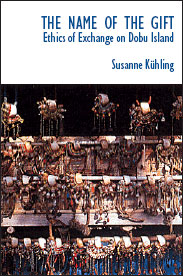Dobu Ethics of Exchange on Dobu Island/Papua New Guinea
This book is an ethnography of Dobu, a Massim society of Papua New
Guinea, which has been renowned in social anthropology since Fortune’s Sorcerers of Dobu (1932).
Focussing on exchange and its underlying ethics, The Name of the Gift explores the concept of
the person in the Dobu world-view.
To avoid undue precategorisation of exchange forms, objects and events, the book is structured
according to vernacular terms and concepts. ‘Names of gifts’ serve as keys to the analysis
of contemporary exchanges as exemplifications of human agency in interaction. Persons are
conceptualised as both individual and ‘dividual’, as enmeshed within a network of relationships,
contour and density of which depend on individual qualities. These qualities are tied to the system
of morals and become visible in exchanges.
The book examines major aspects of exchange such as labour, mutual support, apologetic gifts,
revenge and punishment, kula exchange, and mortuary gifts. It discusses in detail the characteristics
of small gifts (such as betel nuts), Big Gifts (kula valuables, pigs and large yams) and money
as they appear in exchange contexts.
The ethnography begins with an analysis of the construct of the Dobu person, and sets out
to examine everyday practices and values. The belief system (incorporating witches, sorcerers,
and a Christian God) is shown to have a powerful influence on individual conduct due to its
panoptic character. The institutions that link Dobu with the outside world are examined in terms
of the ideology concerning money: the Church receives offerings for God; the difficulties faced by
trade-store owners evince conflicting notions concerning monetary wealth.
The last two chapters delve into lived experience in two major domains of Dobu exchange.
Kula is presented in the narrative of the journey to Duau, exploring the knowledge that matters
for kula traders and the experiential sensations that are a motivational factor for engaging
in kula. The final chapter, based on the narrative of a sagali feast, examines the ideology of
fatherhood in the light of Dobu concepts of love and duty. The caricature that was Fortune’s
‘Dobuan’ is finally laid to rest.
|
|

AUTHOR:
Susanne Kühling
STATUS:
Back List
PRICE:
$39.95
ILLUSTRATIONS:
20 photographs, maps
FORMAT:
Portrait; softcover; c. 300 pages
DIMENSIONS:
204 x 135 mm
ISBN:
1863332014
|
|

